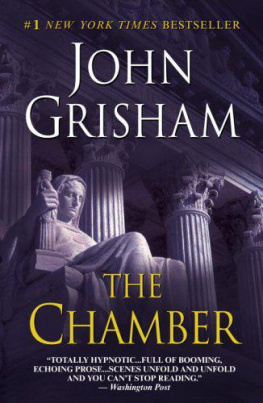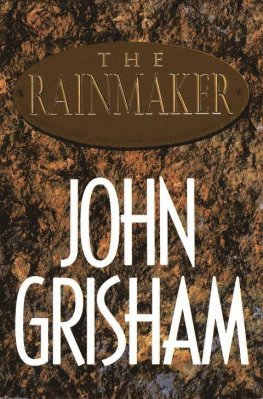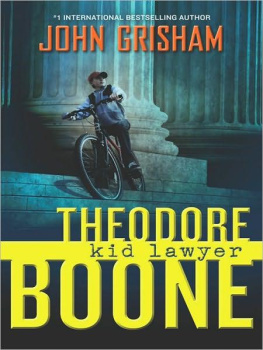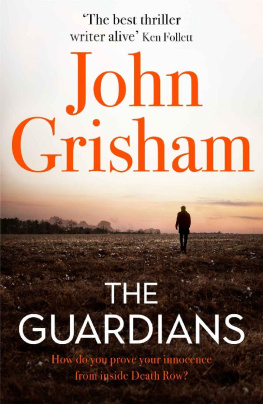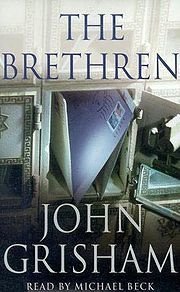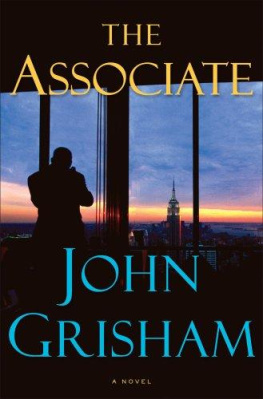John Grisham - The Chamber
Here you can read online John Grisham - The Chamber full text of the book (entire story) in english for free. Download pdf and epub, get meaning, cover and reviews about this ebook. year: 1995, publisher: Ulverscroft Large Print Books, genre: Detective and thriller. Description of the work, (preface) as well as reviews are available. Best literature library LitArk.com created for fans of good reading and offers a wide selection of genres:
Romance novel
Science fiction
Adventure
Detective
Science
History
Home and family
Prose
Art
Politics
Computer
Non-fiction
Religion
Business
Children
Humor
Choose a favorite category and find really read worthwhile books. Enjoy immersion in the world of imagination, feel the emotions of the characters or learn something new for yourself, make an fascinating discovery.
- Book:The Chamber
- Author:
- Publisher:Ulverscroft Large Print Books
- Genre:
- Year:1995
- Rating:4 / 5
- Favourites:Add to favourites
- Your mark:
- 80
- 1
- 2
- 3
- 4
- 5
The Chamber: summary, description and annotation
We offer to read an annotation, description, summary or preface (depends on what the author of the book "The Chamber" wrote himself). If you haven't found the necessary information about the book — write in the comments, we will try to find it.
The Chamber — read online for free the complete book (whole text) full work
Below is the text of the book, divided by pages. System saving the place of the last page read, allows you to conveniently read the book "The Chamber" online for free, without having to search again every time where you left off. Put a bookmark, and you can go to the page where you finished reading at any time.
Font size:
Interval:
Bookmark:
The Chamber
I've travelled the world twice over,Met the famous: saints and sinners,Poets and artists, kings and queens,Old stars and hopeful beginners,I've been where no-one's been before,Learned secrets from writers and cooksAll with one library ticketTo the wonderful world of books.-JANICE JAMES
THE CHAMBER
Young lawyer Adam Hall volunteers to take on the defence of a convicted murderer on Mississippi's Death Row. His client is seventy-year-old Sam Cayhall, whose crime was the killing of two Jewish children in a 1967 Ku Klux Klan bombing. Sam despises lawyers and Northern liberals, and there is little hope that he will hire the young man. But Adam has a secret, hitherto hidden in his own tortured past - he is Sam's grandson. Adam wants to find out what drove his father to suicide, destroying his family, and the answer lies with Sam, unrepentant and as prejudiced as the Old South.
JOHN GRISHAM
THE CHAMBER
Complete and UnabridgedCHARNWOODLeicester
First published in Great Britain in 1994 byCenturyLondon
First Charnwood Editionpublished July 1995by arrangement withRandom House (UK) LimitedLondon
The right of John Grisham to be identified as theauthor of this work has been asserted by himin accordance with theCopyright, Designs and Patents Act, 1988
Copyright 1994 by John GrishamAll rights reserved
British Library CIP Data
Grisham, JohnThe chamber.--Large print ed.--Charnwood library seriesI. Title II. series813.54 (Fl
ISBN 0-7089-8843-1
This book is printed on acid-free paper :)
Acknowledgments
I was a lawyer once, and represented people charged with all sorts of crimes. Fortunately, I never had a client convicted of capital murder and sentenced to death. I never had to go to death row, never had to do the things the lawyers do in this story.Since I despise research, I did what I normally do when writing a novel. I found lawyers with expertise, and I befriended them. I called them at all hours and picked their brains. And it is here that I thank them.Leonard Vincent has been the attorney for the Mississippi Department of Corrections for many years, and he opened his office to me. He helped me with the law, showed me his files, took me to death row, and toured me around the vast state penitentiary known simply as Parchman. He told me many stories that somehow found their way into this one. Leonard and I are still struggling with the perplexities of the death penalty, and I suspect we always will. Thanks also to his staff, and to the guards and personnel at Parchman.Jim Craig is a man of great compassion and a fine lawyer. As the Executive Director of the Mississippi Capital Defense Resource Center,he's the official attorney for most of the inmates on death row. He deftly steered me through the impenetrable maze of post conviction appeals and habeas corpus warfare. The inevitable mistakes are mine, not his.I went to law school with Tom Freeland and Guy Gillespie, and I thank them for their ready assistance. Marc Smirnoff is a friend and the editor of The Oxford American, and as usual, worked on the manuscript before I sent it to New York.Thanks also to Robert Warren and William Ballard for their help. And, as always, a very special thanks to my best friend, Renee, who still reads each chapter over my shoulder.
1
THE decision to bomb the office of the radical Jew lawyer was reached with relative ease. Only three people were involved in the process. The first was the man with the money. The second was a local operative who knew the territory. And the third was a young patriot and zealot with a talent for explosives and an astonishing knack for disappearing without a trail. After the bombing, he fled the country and hid in Northern Ireland for six years.The lawyer's name was Marvin Kramer, a fourth-generation Mississippi Jew whose family had prospered as merchants in the Delta. He lived in an antebellum home in Greenville, a river town with a small but strong Jewish community, a pleasant place with a history of little racial discord. He practiced law because commerce bored him. Like most Jews of German descent, his family had assimilated nicely into the culture of the Deep South, and viewed themselves as nothing but typical Southerners who happened to have a different religion. Anti-Semitism rarely surfaced. For the most part, they blended with the rest of established society and went about their business.Marvin was different. His father sent him up North to Brandeis in the late fifties. He spent four years there, then three years in law1school at Columbia, and when he returned to Greenville in 1964 the civil rights movement had center stage in Mississippi. Marvin got in the thick of it. Less than a month after opening his little law office, he was arrested along with two of his Brandeis classmates for attempting to register black voters. His father was furious. His family was embarrassed, but Marvin couldn't have cared less. He received his first death threat at the age of twenty-five, and started carrying a gun. He bought a pistol for his wife, a Memphis girl, and instructed their black maid to keep one in her purse. The Kramers had twin two-year-old sons.The first civil rights lawsuit filed in 1965 by the law offices of Marvin B. Kramer and Associates (there were no associates yet) alleged a multitude of discriminatory voting practices by local officials. It made headlines around the state, and Marvin got his picture in the papers. He also got his name on a Klan list of Jews to harass. Here was a radical Jew lawyer with a beard and a bleeding heart, educated by Jews up North and now marching with and representing Negroes in the Mississippi Delta. It would not be tolerated.Later, there were rumors of Lawyer Kramer using his own money to post bail for Freedom Riders and civil rights workers. He filed lawsuits attacking whites-only facilities. He paid for the reconstruction of a black church bombed by the Klan. He was actually seen welcoming Negroes into his home. He made speeches before Jewish groups up North and urged2them to get involved in the struggle. He wrote sweeping letters to newspapers, few of which were printed. Lawyer Kramer was marching bravely toward his doom.The presence of a nighttime guard patrolling benignly around the flower beds prevented an attack upon the Kramer home. Marvin had been paying the guard for two years. He was a former cop and he was heavily armed, and the Kramers let it be known to all of Greenville that they were protected by an expert marksman. Of course, the Klan knew about the guard, and the Klan knew to leave him alone. Thus, the decision was made to bomb Marvin Kramer's office, and not his home.The actual planning of the operation took very little time, and this was principally because so few people were involved in it. The man with the money, a flamboyant redneck prophet named Jeremiah Dogan, was at the time the Imperial Wizard for the Klan in Mississippi. His predecessor had been loaded off to prison, and Jerry Dogan was having a wonderful time orchestrating the bombings. He was not stupid. In fact, the FBI later admitted Dogan was quite effective as a terrorist because he delegated the dirty work to small, autonomous groups of hit men who worked completely independent of one another. The FBI had become expert at infiltrating the Klan with informants, and Dogan trusted no one but family and a handful of accomplices. He owned the largest used car lot in Meridian, Mississippi, and had made plenty of money on all sorts of shady deals.3He sometimes preached in rural churches.The second member of the team was a Klansman by the name of Sam Cayhall from Clanton, Mississippi, in Ford County, three hours north of Meridian and an hour south of Memphis. Cayhall was known to the FBI, but his connection to Dogan was not. The FBI considered him to be harmless because he lived in an area of the state with almost no Klan activity. A few crosses had been burned in Ford County recently, but no bombings, no killings. The FBI knew that Cayhall's father had been a Klansman, but on the whole the family appeared to be rather passive. Dogan's recruitment of Sam Cayhall was a brilliant move.The bombing of Kramer's office began with a phone call on the night of April 17, 1967. Suspecting, with good reason, that his phones were tapped, Jeremiah Dogan waited until midnight and drove to a pay phone at a gas station south of Meridian. He also suspected he was being followed by the FBI, and he was correct. They watched him, but they had no idea where the call was going.Sam Cayhall listened quietly on the other end, asked a question or two, then hung up. He returned to his bed, and told his wife nothing. She knew better than to ask. The next morning he left the house early and drove into the town of Clanton. He ate his daily breakfast at The Coffee Shop, then placed a call on a pay phone inside the Ford County Courthouse.Two days later, on April 20, Cayhall left Clanton at dusk and drove two hours to4Cleveland, Mississippi, a Delta college town an hour from Greenville. He waited for forty minutes in the parking lot of a busy shopping center, but saw no sign of a green Pontiac. He ate fried chicken in a cheap diner, then drove to Greenville to scout the law offices of Marvin B. Kramer and Associates. Cayhall had spent a day in Greenville two weeks earlier, and knew the city fairly well. He found Kramer's office, then drove by his stately home, then found the synagogue again. Dogan said the synagogue might be next, but first they needed to hit the Jew lawyer. By eleven, Cayhall was back in Cleveland, and the green pontiac was parked not at the shopping center but at a truck stop on Highway 61, a secondary site. He found the ignition key under the driver's floor mat, and took the car for a drive through the rich farm fields of the Delta. He turned onto a farm road and opened the trunk. In a cardboard box covered with newspapers, he found fifteen sticks of dynamite, three blasting caps, and a fuse. He drove into town and waited in an allnight cafe.At precisely 2 A.M. the third member of the team walked into the crowded truck stop and sat across from Sam Cayhall. His name was Rollie Wedge, a young man of no more than twenty-two, but a trusted veteran of the civil rights war. He said he was from Louisiana, now lived somewhere in the mountains where no one could find him, and though he never boasted, he had told Sam Cayhall several times that he fully expected to be killed in the struggle for white supremacy. His father was a Klansman and a5demolition contractor, and from him Rollie had learned how to use explosives.Sam knew little about Rollie Wedge, and didn't believe much of what he said. He never asked Dogan where he found the kid.They sipped coffee and made small talk for half an hour. Cayhall's cup shook occasionally from the jitters, but Rollie's was calm and steady. His eyes never blinked. They had done this together several times now, and Cayhall marveled at the coolness of one so young. He had reported to Jeremiah Dogan that the kid never got excited, not even when they neared their targets and he handled the dynamite.Wedge's car was a rental from the Memphis airport. He retrieved a small bag from the backseat, locked the car, and left it at the truck stop. The green Pontiac with Cayhall behind the wheel left Cleveland and headed south on Highway 61. It was almost 3 A.M., and there was no traffic. A few miles south of the village of Shaw, Cayhall turned onto a dark, gravel road and stopped. Rollie instructed him to stay in the car while he inspected the explosives. Sam did as he was told. Rollie took his bag with him to the trunk where he inventoried the dynamite, the blasting caps, and the fuse. He left his bag in the trunk, closed it, and told Sam to head to Greenville.They drove by Kramer's office for the first time around 4 A.m. The street was deserted, and dark, and Rollie said something to the effect that this would be their easiest job yet.Too bad we can't bomb his house, Rollie6said softly as they drove by the Kramer home.Yeah. Too bad, Sam said nervously. But he's got a guard, you know.Yeah, I know. B_ ut the guard would be easy.Yeah, I guess. But he's got kids in there, you know.Kill 'em while they're young, Rollie said. Little Jew bastards grow up to be big Jew bastards.Cayhall parked the car in an alley behind Kramer's office. He turned off the ignition, and both men quietly opened the trunk, removed the box and the bag, and slid along a row of hedges leading to the rear door.Sam Cayhall jimmied the rear door of the office and they were inside within seconds. Two weeks earlier, Sam had presented himself to the receptionist under the ruse of asking for directions, then asked to use the rest room. In the main hallway, between the rest room and what appeared to be Kramer's office, was a narrow closet filled with stacks of old files and other legal rubbish.Stay by the door and watch the alley, Wedge whispered coolly, and Sam did exactly as he was told. He preferred to serve as the watchman and avoid handling the explosives.Rollie quickly sat the box on the floor in the closet, and wired the dynamite. It was a delicate exercise, and Sam's heart raced each time as he waited. His back was always to the explosives, just in case something went wrong.They were in the office less than five minutes.7Then they were back in the alley strolling nonchalantly to the green Pontiac. They were becoming invincible. It was all so easy. They had bombed a real estate office in Jackson because the realtor had sold a house to a black couple. A Jewish realtor. They had bombed a small newspaper office because the editor had uttered something neutral on segregation. They had demolished a Jackson synagogue, the largest in the state.They drove through the alley in the darkness, and as the green Pontiac entered a side street its headlights came on.In each of the prior bombings, Wedge hadud a fifteen-minute fuse, one simply lit withsec[ a match, very similar to a firecracker. And as part of the exercise, the team of bombers enjoyed cruising with the windows down at a point always on the outskirts of town just as the explosion ripped through the target. They had heard and felt each of the prior hits, at a nice distance, as they made their leisurely getaways.But tonight would be different. Sam made a wrong turn somewhere, and suddenly they were stopped at a railroad crossing staring at flashing lights as a freighter clicked by in front of them. A rather long freight train. Sam checked his watch more than once. Rollie said nothing. The train passed, and Sam took another wrong turn. They were near the river, with a bridge in the distance, and the street was lined with rundown houses. Sam checked his watch again. The ground would shake in less than8five minutes, and he preferred to be easing into the darkness of a lonely highway when that happened. Rollie fidgeted once as if he was becoming irritated with his driver, but he said nothing.Another turn, another new street. Greenville was not that big a city, and if he kept turning Sam figured he could work his way back to a familiar street. The next wrong turn proved to be the last. Sam hit the brakes as soon as he realized he had turned the wrong way on a one-way street. And when he hit the brakes, the engine quit. He yanked the gearshift into park, and turned the ignition. The engine turned perfectly, but it just wouldn't start. Then, the smell of gasoline.Dammit! Sam said through clenched teeth. Dammit!Rollie sat low in his seat and stared through the window.Dammit! It's flooded! He turned the key again, same result.Don't run the battery down, Rollie said slowly, calmly.Sam was near panic. Though he was lost, he was reasonably sure they were not far from downtown. He breathed deeply, and studied the street. He glanced at his watch. There were no other cars in sight. All was quiet. It was the perfect setting for a bomb blast. He could see the fuse burning along the wooden floor. He could feel the jarring of the ground. He could hear the roar of ripping wood and sheetrock, brick and glass. Hell, Sam thought as he tried9to calm himself, we might get hit with debris.You'd think Dogan would send a decent car, he mumbled to himself. Rollie did not respond, just kept his gaze on something outside his window.At least fifteen minutes had passed since they had left Kramer's office, and it was time for the fireworks. Sam wiped rows of sweat from his forehead, and once again tried the ignition. Mercifully, the engine started. He grinned at Rollie, who seemed completely indifferent. He backed the car a few feet, then sped away. The first street looked familiar, and two blocks later they were on Main Street. What kind of fuse did you use? Sam finally asked, as they turned onto Highway 82, less than ten blocks from Kramer's office.Rollie shrugged as if it was his business and Sam shouldn't ask. They slowed as they passed a parked police car, then gained speed on the edge of town. Within minutes, Greenville was behind them.What kind of fuse did you use? Sam asked again with an edge to his voice.I tried something new, Rollie answered without looking.What?You wouldn't understand, Rollie said, and Sam did a slow burn.A timing device? he asked a few miles down the road.Something like that.
Font size:
Interval:
Bookmark:
Similar books «The Chamber»
Look at similar books to The Chamber. We have selected literature similar in name and meaning in the hope of providing readers with more options to find new, interesting, not yet read works.
Discussion, reviews of the book The Chamber and just readers' own opinions. Leave your comments, write what you think about the work, its meaning or the main characters. Specify what exactly you liked and what you didn't like, and why you think so.

